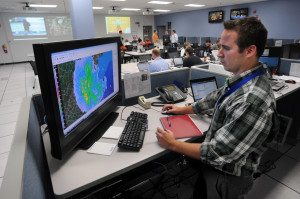 Meteorologists study the Earth’s atmosphere and use their knowledge about weather to assist emergency services departments, which are organized departments that respond to disasters and emergency situations. Their unique skills in weather prediction are used by emergency management units to prepare for severe weather events. Examples of the different types of meteorology jobs in emergency services include: weather forecasters, climate analysts and emergency management coordinators.
Meteorologists study the Earth’s atmosphere and use their knowledge about weather to assist emergency services departments, which are organized departments that respond to disasters and emergency situations. Their unique skills in weather prediction are used by emergency management units to prepare for severe weather events. Examples of the different types of meteorology jobs in emergency services include: weather forecasters, climate analysts and emergency management coordinators.
Weather Forecasters
The ever-changing nature of weather creates a demand for meteorologists, particularly in state and federal emergency services departments. Meteorologists use their skills in a variety of ways to assist with emergency planning and response, including predicting severe weather, determining when and where storms will reach land, and assisting with the creation and updating of emergency response plans. State and local weather agencies may employ meteorologists in a variety of positions that involve storm forecasting.
Climate Analysts
Due to the increasing threat of climate change and global warming, there is a continued demand for skilled meteorologists to work in a variety of different jobs that require intimate knowledge of weather phenomena. The U.S. government’s National Weather Service, part of the U.S. National Oceanic and Atmospheric Administration (NOAA), employs meteorologists in a variety of positions in climatology and weather research. NOAA meteorologists may also provide research on the impact of weather on oceans, waterways, and heavily populated areas.
Emergency Management Coordinators
The U.S. Federal Emergency Management Agency (FEMA) employs meteorologists in its prediction of natural weather events and in its Community Emergency Response Teams (CERTs). Meteorologists may provide services related to disaster prevention, including issuing weather warnings and storm watches. The U.S. Armed Forces has a continuing demand for meteorologists, as does the National Hurricane Center and the National Storm Prediction Center. Highly skilled meteorologists that specialize in different branches of the atmospheric sciences can be employed in diverse emergency services positions in industries such as agriculture, transport, and education. Some meteorologists may choose to work as private consultants in emergency planning. Others may use their skills to complete research on weather that can be used by emergency planning agencies.
Professors
Meteorologists that work in academia may provide relevant weather research to assist with the drafting of disaster mitigation plans. They may also assist with the reporting of severe weather events in state and local media and the issuance of media releases in disaster situations.
Broadcast Meteorologist and More
Media outlets often employ meteorologists to assist with weather reporting and field work. Meteorologists can also be seen working with urban planners, construction companies, and real estate developers to determine any future environmental impact that can occur due to severe weather. They may also work with local agencies to determine the economic costs of disaster response services.
Related Resource: National Weather Service
Meteorologists are truly invaluable members of emergency services departments due to their desirable skills and education. Their employment in a wide variety of unique and exciting positions makes meteorology an attractive career choice for many. The continued demand for meteorologists in emergency services indicates the strong need for qualified individuals with a knowledge of weather forecasting. Meteorologists’ employment in emergency services departments will certainly continue, as their knowledge and skills are highly relevant in disaster planning and response.